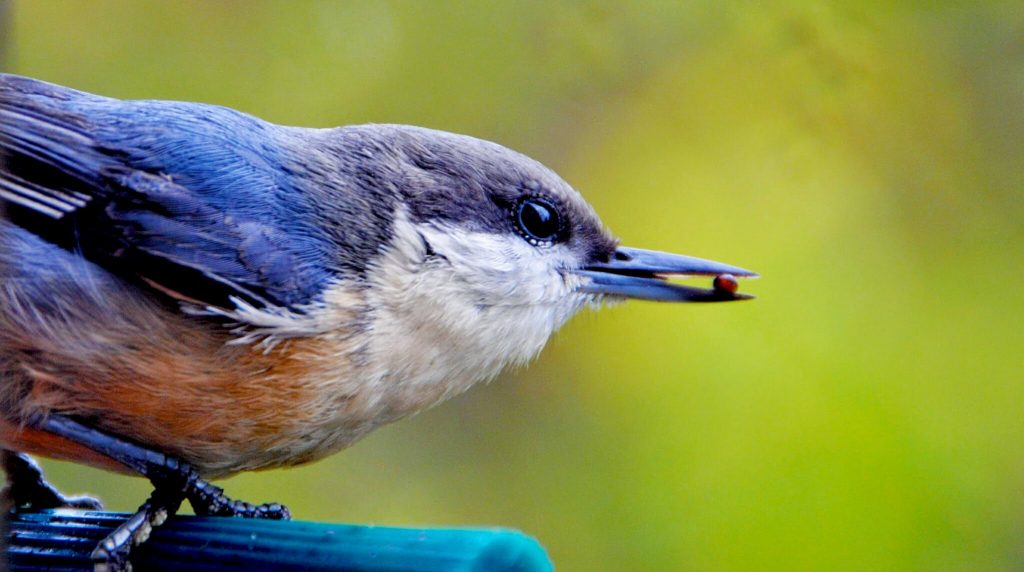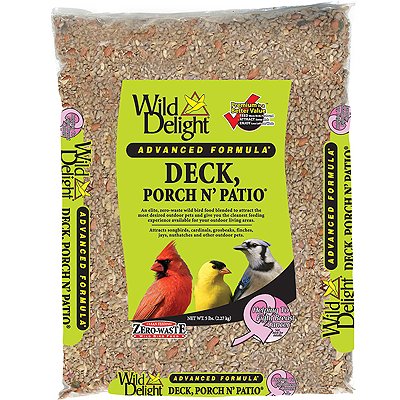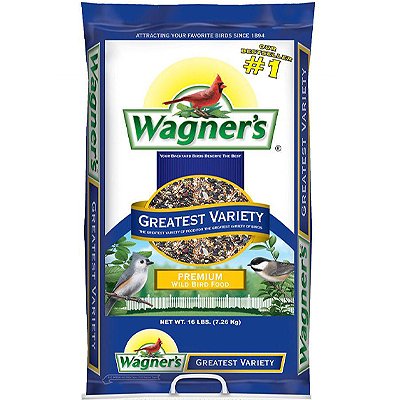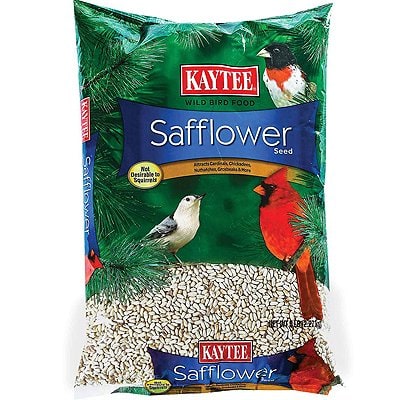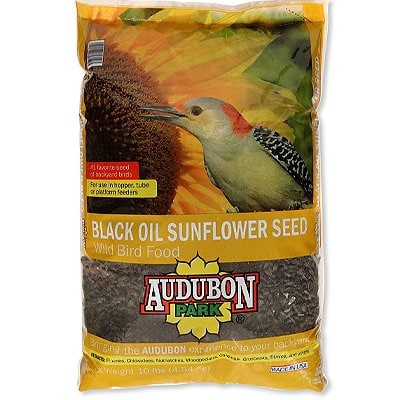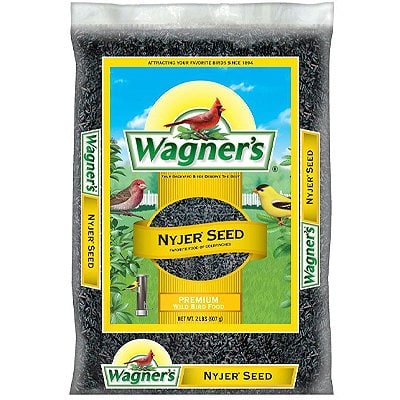If your neighborhood has a variety of birds, you will definitely love watching them flocking and perching over your garden. However, choosing the best bird seed is one of the most efficent ways to attract them.
There are many types of bird seeds and the problem is not all birds eat them. Therefore, it is essential for you to understand how to choose the bird seed for songbirds and other birds. This guide will help you opt for the best seeds for your birdies.
We Recommend
Best Bird Seed
1. Audubon Park Black Oil Sunflower Seed
The Audubon Black Oil Sunflower seed is specifically produced for wild birds and comes in a quantity of 10 pounds.
Not to mention, it is one of the most popular bird feed.
The product will help attract a variety of wild birds, including titmice, grosbeaks, cardinals, woodpeckers, nuthatches, chickadees, and finches.
Black oil sunflower seeds are the best bird seed for platform feeders for feeding birds in your backyard.
The thin shell of these seeds makes it easy for different types of birds to carry and open the seeds. That means your birdies will need to put a minimal effort to eat these seeds.
Since they are family farmed seeds, this product will offer you with high-quality bird seed. However, you will need to add them to the feeders to feed your birdies. These seeds will last you longer, as they are enclosed in the shell.
Check the price of Audubon Park Black Oil Sunflower Seed here
What we liked
- It offers excellent source of fats
- Seeds have thin coverings
- Easy to eat for birds
- provides a great quality bird feed
- Attract a variety of birds to your yard
What we didn’t like
- It may contain leaves and plant stalk
2. Kaytee Safflower Seed
It is a high oil content seed that helps attract not only cardinals but also many other birds to your backyard.
The safflower seeds it includes aid which discourage squirrels from eating the feed because of its bitter taste.
But as a warning, some users reported of squirrels developing a taste for them.
So, do not get your hopes too high and install barriers to keep them away from your birdfeed.
Cardinals love to dine on safflower seeds. So, if you want to see these beautiful creatures in your garden or backyard, add Kaytee Safflower seeds in your feeder.
What we liked
- Safflower seeds help attract cardinals
- High-oil content seeds
- Offers premium quality seeds
- May keep squirrels away from the feeder
- Includes high protein
What we didn’t like
- Attracts only a smaller variety of birds
- The hard shells of the seeds may create a mess in your feeder
3. Wagner's Greatest Variety Blend Bird Food
If you want to lure diverse types of birds like titmice, jays, cardinals, finches, woodpeckers, and chickadees, then this birdseed is the best option for you.
The product includes the best blend and mix Bird food. The tempting mix of food will certainly attract different colorful songbirds.
Wagner’s 62059 contains eleven varieties of ingredients, including 40% of sunflower seeds.
You can fill this feed into your birdfeeder and enjoy watching them flocking, perching, and munching on the treat. Overall, it includes a great mix of seeds and nuts that a variety of bird species will love to eat.
After putting the seeds in the feeder, you will see various birds perching in your yard, gobbling the seeds up.
Check the price of Wagner’s Greatest Variety Blend Bird Food here
What we liked
- It serves as a great feed for songbirds
- You can buy it in bulk
- Compatible with different styles of feeders
- Includes a good blend of seeds
- It can attract different species of birds
What we didn’t like
- It is quite expensive as compared to other products
- It comes with lots of red and white millet
4. Wagner's Nyjer Seed
If your area has finches (especially goldfinches), then Nyjer seed is the best choice.
This product comes with an easy-to-lock option, so you will need to open it to fill in the feeder and then zip it again.
The pack includes around 150,000 seeds per 250 grams. The quantity is ample enough to satisfy your birdies.
The product includes a chart that you will find on the back of the bag.
This chart indicates the types of seeds different birds prefer.
Other than this, it contains pure Nyjer seeds that include high-fat content and high protein. Since Wagner has produced it specifically for finches, you will need to fill them in finch feeders having tiny holes and small perches.
What we liked
- It comes with a tempting seed scent that will attract birds
- It is a perfect feed for birdseed for finches
- The content included can attract American Goldfinch, Purple Finch, Pine Siskin, and other songbirds
- It offers fine quality
What we didn’t like
- It comes at quite a higher price than other feeds
5. Wild Delight No Waste Bird Food
It comes as the block of bird seed, which you can hang up on your deck or porch easily.
That means you will not need a bird feeder to provide the birds this feed.
However, it is important to mention here that some of the blocks may have different blends of seeds – some contain a blend of fruits and nuts, whereas others nuts and seeds.
Using the bird’s feed mix will help you determine what your birds like to eat.
The Wild Delight Deck is a zero-waste elite wild bird food blend. It offers the cleanest and nutrients-full experience to your birdies.
From Jays and finches to grosbeaks and cardinals, it helps attract all types of birds. If you have bigger feeders, this makes a great feed for your birds.
What we liked
- Perfect for a deck or porch
- Comes in the smaller size
- Includes chunks of real fruit
- Contains enough nutrients
What we didn’t like
- Price can be high for some
This Lyric Sunflower Kernels is a great no-mess option for attracting the largest amount of birds in your yard.
It attracts buntings, cardinals, chickadees, finches, flickers, grosbeaks, nuthatches, redpolls, titmice, towhees, woodpeckers.
The kernels in this bird seed are the heart of “meat” of black oil sunflower, which is the most popular wild bird food.
The kernels provide protein and fats that wild birds need. What I really like about this wild bird seed is that there won’t be any waste of shells on your deck or porch.
It’s 100% edible; there’s no waste and no weeds. As it’s 100% edible, this will stretch your feeding dollars even further.
Because Lyric Sunflower Kernels are made up of pre-hulled seeds, it is important to use a feeder that protects them from snow and rain. If these unshelled seeds get wet or damp, they will spoil quickly.
These sunflower kernels can be used in most feeders (including tray feeders, tube feeders, and hopper feeders).
What we liked
- Great all-around bird food for wild birds
- Contains no shells and is 100% edible
- No mess, no waste, no weeds
- Use in a feeder that offers protection from the elements
- Stay Fresh Technology Inside
- Attracts a wide variety of birds
What we didn’t like
- Cannot get wet or will spoil quickly
Kaytee Mealworms are a great high-protein food source for many wild birds. It’s a high-energy treat that attracts birds that may be difficult to attract with many regular bird seed blends.
For example, mealworms are a great treat for Bluebirds, Wrens, robins, chickadees, woodpeckers, and cardinals.
Mealworms are also an important source of food for baby birds. Mealworms can be used alone in a feeder or mixed with your favorite wild bird seed.
Kaytee Mealworms are known for their high-quality. Mealworms are oven-dried for the best quality and it also allows to keep mealworms free of preservatives, additives and ensures the nutrition of the bird food.
The best feeders for these mealworms are platform feeders and mesh feeders, but you can use whatever you like. These mealworms are great to use all-year-round.
One more thing I like about this brand is that they use an environmentally friendly package that presents 70.8% less packaging weight than ordinary plastic containers.
What we liked
- High protein and high energy treat
- Best bird seed for bluebirds
- Can be fed alone in a feeder or mixed with a favorited seed
- An important source of food for baby birds
- Oven-dried (means higher quality)
What we didn’t like
- Live mealworms are always better than dried ones
This Pine Tree Farms Suet Cake is probably the best choice if you want to attract woodpeckers to your feeders. But it also works well for other birds who enjoy suet.
This is probably one of the best suet cake available. It attracts a wide variety of birds and doesn’t come with any fillers.
The main ingredients include rendered beef suet, chopped peanuts, and peanut butter (yummy).
I have seen Downy, hairy and red-bellied woodpeckers, yellow-rumped and pine warblers, chickadees, titmice, Carolina wrens, and even the bluebirds on my suet feeder.
I also like that unlike many other suet cakes, this suet smells so fresh and yummy. I sometimes break up the cakes and put them in my smaller caged feeders.
Keep in mind to place this suet cake into feeder and hang at least 5 feet off the ground.
Check the price of Pine Tree Farms Peanut Butter Suet Cake here
What we liked
- Pine Tree Farms Peanut Butter Suet Cake
- Wild Bird Food For Year ‘Round Feeding
- Attracts a wide variety of birds and is a great source of energy
- 6 Pack at 12 ounces each
- Provides your wild birds with lots of energy and protein
- Doesn’t contain any cheap fillers
What we didn’t like
- Not all birds enjoy this flavor
Lyric Wild Bird Food is a premium brand that is hand-crafted in small batches in the family-owned and operated business of bird enthusiasts.
This nut and fruit mix is a high energy bird mix made from all-natural foods with no fillers. It’s made from 70% dried fruit & nuts.
It’s a hand-crafted blend of dried cranberries, raisins, shelled peanuts, almonds, cashews, pecans, Valencia peanuts, pistachios; steamed crimped corn, black oil sunflower seeds, sunflower kernels and shelled pumpkin seeds.
This gourmet blend is great to attract chickadees, robins, orioles, blue jays, titmice, buntings, cardinals, grosbeaks, towhees, nuthatches, and Cedar Waxwings.
Use a feeder that protects them from snow and rain. If these unshelled nuts & seeds get wet or damp, they will spoil quickly. Be sure to use a feeder specifically designed for nut mixes as the large pieces may otherwise clog the feeder.
Check the price of Lyric Fruit & Nut High Energy Wild Bird Food here
What we liked
- A high-energy wild bird mix featuring a gourmet blend of select fruits, seeds, and shell-free nuts
- All-natural ingredients
- No fillers for less waste
- A gourmet blend of ingredients
- Made using Stay Fresh Technology
- Attracts a variety of birds
What we didn’t like
- This blend had quite large chunks, not ideal for small feeders
This mealworm treat cake is made from Hulled Sunflower Seed, Oil Sunflower Seed, Safflower Seed, Dried Mealworms, Gelatin, Dextrose, Honey, Glycerin.
For the best results, hang the cake approximately 5 feet above the ground. I have seen Cardinals, chickadees, woodpeckers, and pewees enjoy this treat in my yard.
This suet has also been particularly popular with the blue jays as well as the wild parrots that live in Florida.
What we liked
- A High-Energy Treat To Attract Bluebirds, Chickadees, Woodpeckers, And More.
- Delicious And Nutritious
- Barrier Package Keeps Product Fresh
- Easy To Fit Into Existing Wire Suet And Seed Cake Feeders
What we didn’t like
- Somewhat higher pricepoint
Here’s another great wild bird food option from Lyric. This is a bird mix designed specifically for Finches.
Finches differ from other songbirds that they eat seeds almost exclusively all year long.
During nesting season, finches continue to eat seed and even feed them to their nestlings.
The seeds look fresh and the birds seem to like eating them.
It’s made from all-natural, filler-free ingredients: canary seed, canola seed, nyjer seed, golden millet seed, and sunflower kernels.
Lyric Finch food will attract House Finches, Purple Finches, American Goldfinches, sparrows, and many more.
Because the seeds in this mix are quite small, be sure to use a feeder specifically designed to hold Nyjer seed.
A tube feeder with very small feeding ports, mesh feeder with tiny mesh holes, or a sock feeder works best. Be sure to protect the seed from the rain and snow as it can cause it to spoil or clump.
Check the price of Lyric Finch Small Songbird Wild Bird Mix here
What we liked
- Premium blend
- All-natural food with no fillers
- Five nutritional ingredients is a special mix of small seeds
- great for a feeder with small openings
- Great for small songbirds
What we didn’t like
- Small seeds tend to fall through the cracks of the feeder
Types of Bird Seed
No doubt, there are several seeds that attract a wide variety of birds. However, backyard birds usually love to eat sunflower seeds. Other varieties of seeds can help lure birds of your neighborhood to your yard or garden. It is worth mentioning here that a mix of oats, millets, and other fillers are never attractive to birds.
Sunflower – You will find two kinds of sunflower seeds- striped and black oil. The later ones have thin shells that are easy for birds to crack open. Well, a majority of winter birds prefer these seeds. Striped sunflower seeds, on the other hand, have a thicker shell.
Safflower – These seeds have a thick shell and therefore, some birds may find it hard to crack open. However, these seeds are among the favorite feed for cardinals. Other than them, native sparrows, doves, chickadees, and grosbeaks also eat it.
Nyjer or Thistle – These seeds are perfect feed for small finches, including American Goldfinches, Common Redpolls, Pine Siskins, and Indigo Buntings. Thistle seeds are sterilized with heat to limit the chance of spreading. The process ensures to retain the food value.
White Proso Millet – It is the favorite food for ground-feeding birds, which include cardinals, juncos, towhees doves, Native American sparrows, and quails. Unfortunately, House Sparrows and cowbirds love this food. If you want to attract only cardinals and other songbirds, avoid using the millet.
Canary seed and Rapeseed – Cowbirds and House Sparrows love to gobble up canary seed. Sure, you probably do not want to attract these birds. So, it is better not to add canary seeds in your feeder. A few birds, including juncos, finches, doves, and quails like to eat rapeseed. However, rapeseeds are more prone to spoil over time.
Peanuts – If you want to attract woodpeckers, titmice, chickadees, blue jays, add peanuts into your feeder. However, the problem is squirrels and raccoons also love to munch on it. Install preventative measures to keep these animals away from your feeder. Also, check out the best squirrel proof bird feeders that actually work.
Corn – Birds including doves, jays, ravens, crows, grosbeaks, cardinals, pheasants, and grouse love to eat corn. However, they are equally favorite food to raccoons, and other animals you won’t want to subsidize. In addition, corn is often contaminated with aflatoxins.
Avoid Cheap Bird Seed Mixes
Well, cheap bird seed blends usually contain fillers that most birds do not like. If you use that feed, chances are, birds will fly away from your backyard and never come back again. Buying fillers for your birds is a waste of money.
You should avoid adding the below-mentioned fillers:
- Rice
- Rapeseed
- Buckwheat
- Red millet
- Golden millet
- Flax
When you choose a feed for your bird, make sure it does not contain any filler that your birds will not like. The fillers that you should avoid include rice, buckwheat, and others.
For wild birds, it is best to opt for the foods that go perfectly with their natural diet. Do not offer bagels, cereals, and other human-made foods to these birdies.
Not Every Bird Will Enjoy Bird Seed
When choosing the feed for your bird, keep in mind that not all birds enjoy every type of seed. In other words, it is not necessary that every type of bird in your neighborhood will enjoy sunflower seeds. However, you can add a non-seed feed for your birds.
The following are some options that you can consider to add:
Nectar – Some wild birds like house finches, orioles, and hummingbirds eat nectar. Other than seeds, you can add homemade nectar into your feeder. The recipe is simple- Boil four parts of water and one part sugar. Do not use food coloring, artificial sweetener, or honey.
Suet – It is a raw and hard fat of beef available in the form of raw chunks. It is full of nutrients and provides birds with high energy. Note that it comes in different flavors, yet wild birds are mostly attracted to peanut butter flavor.
Mealworms – Some wild birds love to eat mealworms. This feed is rich in protein. You can find mealworms easily at pet stores. The birds that eat mealworms include warblers, gray catbirds, thrashers, Northern cardinals, bluebirds, nuthatches, and chickadees.
In addition, many types of birds will check seeds to decide whether or not to have another treat at your backyard. Therefore, creating feeding stations with a range of wild bird seed mix will allow you to see different types of birds in your vicinity.
Related: Best Suet Feeders in 2020 That Work
How to Choose the Best Bird Seeds?
When choosing the best bird seed, it is important to ensure the product is of high-quality. Remember, not all seeds offer fine quality; therefore, it is important to opt for the best quality feed for birdies. While these delightful creatures are not usually picky about the food they eat, the higher quality feed will provide them with better nutrition, resulting in healthy flocks.
Quality – When you choose a blend of different seeds, make sure it contains higher proportions of better seeds like millet or sunflowers. Moreover, it should not include fillers and the seeds must have thin shell coverings so that birds can easily eat them.
Ingredients – Check the list of ingredients on every product to ensure it has not been treated with insecticides or pesticides since these can be toxic to birdies. Some products are treated with aflatoxins and contain preservatives that can be dangerous to birds health.
Quantity – Keep in mind that larger quantities of bird feed usually offer a better value. However, if your area does not have heavy traffic of birds, buy only the small quantity. Not to forget, feeds can be spoiled or stale if left for several weeks.
Freshness – Make sure the seeds you are buying are fresh and free of empty hulls, excessive dust, and inedible debris. Check out if there is any sign of mildew, insect infestation, or mold in the product. Ensure the product does not contain any odor.
Verify – Make sure to inspect the seed visually; it should not stale or wet. Check if it contains any insect, fungus, or mold. Do not forget to read the label to ensure it does not contain any harmful ingredients. Note that better quality seeds come in coated paper bags or sturdy plastic packaging.
What birds like what seed?
- Blue Jays – Sunflower seed, safflower, cracked corn, peanuts, suet, bread, peanut butter, lard mixes, seed mixes
- House Finch – Mixed seed, peanuts, fruit, suet, nyjer, sunflower, safflower
- Gold Finch – Nyier, sunflower seed, hulled sunflower, millet, fruit, suet, peanuts
- House Wren – Suet, bread crumbs
- House Sparrow – Mixed seed, sunflower seeds
- Wrens – Suet, suet mix, peanut butter, bread, apples
- Indigo Bunting – Peanuts, millet, variety of seeds
- Northern Flicker – Suet, peanut butter, sunflower seeds, fruit, meat, bread
- Oriole – Oranges, apples, grape jelly, oriole jelly, sugar water, soft raisins
- Painted Bunting – Sunflower seeds, seed mixes
- Pine Grosbeak – Sunflower seeds, grain
- Pine Siskin – Nuts, rolled oats, nyjer, mixed seeds, sunflower seeds sunflower chips, millet, suet
- Purple Finch – Sunflower seeds, nyjer
- Red Crossbills – Sunflower seeds, nyjer
- Red Poll – Suet, bread, sunflower seeds
- Red-Winged Blackbird – Bread, cracked corn, mixed seeds, sunflower seeds, sunflower chips, millet, suet
- Thrushes – Apples, sunflower seed, bread, grapes, suet, mealworms, berries, raisins, nut meal, seed mixes
- Rose Breasted Grosbeaks – Sunflower seeds, grapes, orange halves
- American Goldfinch – Sunflower seeds, nyjer
- Black Billed Magpie – Meat, bread
- Bobwhite Quail – Sunflower seeds, seed mixes
- Brown-Headed Cowbird – Bread, cracked corn, sunflower seeds, seed mixes
- Bushtit – Bread, sunflower seeds, bird seed mixes
- Cardinals – Cracked corn, nuts, sunflower seeds, safflower, millet, peanuts, apple, bread
- Black-Capped Chickadees – Sunflower seeds, peanuts, bread, suet
- Crows – Bread, scraps, corn, suet
- Magpies – Scraps, suet, peanuts, bread
- Downy Woodpeckers – Sunflower seeds, corn, cornbread, peanut butter, suet, shelled peanuts, sunflower seeds
- Grosbeaks – Sunflower seeds, safflower, apple, fruit, suet, millet, bread, peanut kernels
- Buntings – Sunflower seeds, safflower, apple, fruit, suet, millet, bread, peanut kernels
- Grackles – Sunflower seeds, bread, scraps
- Titmouse – Sunflower seeds, suet, bread, safflower, peanuts, peanut kernel
- Chickadees – Peanut kernel, sunflower seeds, suet, bread, safflower
- Nuthatches – Suet, suet mix, sunflower seeds, nuts, cracked corn, bread
- Creepers – Suet, suet mix, sunflower seeds, nuts, cracked corn, bread
- Mockingbirds – Halved apples, fruit, bread, suet, sunflower seeds, nuts
- Thrashers – Halved apples, fruit, bread, suet, sunflower seeds, nuts
- Flycatchers, Phoebes – Bees, wasps, ants, mealworms
- Kinglets – Suet, bread
- Waxwings – Berries, raisins, sliced apple, canned peas, currants, grapes
- Warblers – Suet, suet mix, water, fruit, bread, sugar water, nut pieces
- Tanagers – Suet, fruit, sugar water, mealworms, bread
- Song Sparrows – Sunflower seeds, seed mixes, bread, nyjer, millet
- Starlings – Bread, scraps, suet
- Stellers Jays – Nuts, scraps, suet
- Tree Sparrows – Wild bird seed mixes, millet
- Sparrows – Millet, peanut kernels, suet, bread, canary seed, sunflower seed
- White Breasted Nuthatches – Peanuts, sunflower seeds, suet, safflower
- Hairy Woodpeckers – Sunflower seeds, nuts, cheese, apples, bananas, suet, peanut butter
- Yellow-Bellied Sapsuckers – Nutmeats, suet, fruit
- Quail – Cracked corn, millet, berries
- Pigeons – Cracked corn, sunflower seeds, milo, bread, nyjer, nuts
- Doves – Cracked corn, sunflower seeds, milo, bread, nyjer, nuts
- Roadrunners – Meat scraps, suet
- Hummingbirds – Plant nectars, small insects, sugar water, instant nectars
- Woodpeckers – Insects, fruit, sunflower seeds, suet, nuts, sugar water
- Western Tanagers, Scarlet Tanagers – Orange halves, grapes
- Juncos – Millet, sunflower seeds, cracked corn, peanuts, bread, nutmeats, nyjer, suet
- Towhees – Millet, sunflower seeds, peanuts, grapes, cracked corn, suet
- Rufhouse Sided Towhee – Bird seed mixes, thistle, sunflower seeds, millet, cracked corn
- Baltimore Oriole – Suet, orange halves
- Brown Thrashers – Orange halves, cracked corn
- Carolina Wrens – Suet, sunflower chips
- Cat Birds – Raisins, grapes, orange halves, suet
- Mourning Dove – Millet, nyjer, sunflower chips, safflower, cracked corn
- Pileated Woodpeckers – Suet
- Red-Bellied Woodpeckers – Suet, sunflower seeds, peanuts, orange halves, safflower, cracked corn
Conclusion
The most important thing to remember when choosing the birdseed is that not all birdies enjoy seed. So, if you want a variety of birds flocking over your garden, you will need to add other types of food into your feeder.
You may add nectar, nuts, fruit, and suet to your yard’s buffet to attract different birds. Creating different feeding stations having a mix of bird feed is the most effective way to attract birds to your feeders.
When it comes to opting for the best birdseed to attract birds, ensure to most of your birdseed budget. However, it is imperative to ensure the quality of the product you are purchasing to feed your feathered friends.
Not to mention, birdies deserve to be fed with the food that will not only satisfy their hunger but also nourish their bodies.

